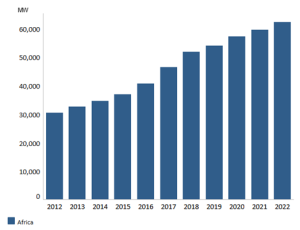Africa
In its 2022 Africa Energy Outlook, the International Energy Agency (IEA) presents a Sustainable Africa Scenario (SAS), in which universal access to affordable electricity by 2030 requires bringing connections to 90 million people a year, which represents a threefold increase over the pace of recent years.[1] Presently, 600 million people, or 43% of the total African population, lack access to electricity - the majority of whom are in sub-Saharan Africa. Some countries - including Ghana, Kenya and Rwanda - are on track for full access by 2030.[2]
Through its detailed analysis, IEA has concluded that the least costly option for 45% of the population without access would be to extend national grids. [3] In contrast, mini-grids and standalone systems (mostly solar-based) appear to be the most viable solution for rural areas, where over 80% of the electricity-deprived live. Achieving energy and climate goals would mean more than doubling Africa's energy investment this decade, costing over $190 billion each year from 2026 to 2030. IEA estimates approximately two-thirds of this investment would go to clean energy.[4]
Renewable Energy Targets
Increasing access to reliable and affordable clean energy is a priority, particularly in sub-Saharan Africa. Out of the 53 African Nationally Determined Contributions (NDCs), 45 of them contain quantified renewable energy targets. Africa could potentially meet nearly 25% of its energy needs from renewable energy sources by 2030.[5] According to information from IRENA, "modern renewables amounting to 310 GW could provide half the continent’s total electricity generation capacity."[6] This is seven times the capacity available in 2017 (approximately 42 GW). This transformation within Africa’s energy sector would require an average annual investment of $70 billion dollars through 2030.[7]
Renewable Energy Use
The following chart presents Africa's renewable energy capacity:

Source: IRENA, 2023[8]
Energy profiles for individual African countries are available here.
Updated by Erin George, December 2023

Comments are closed.